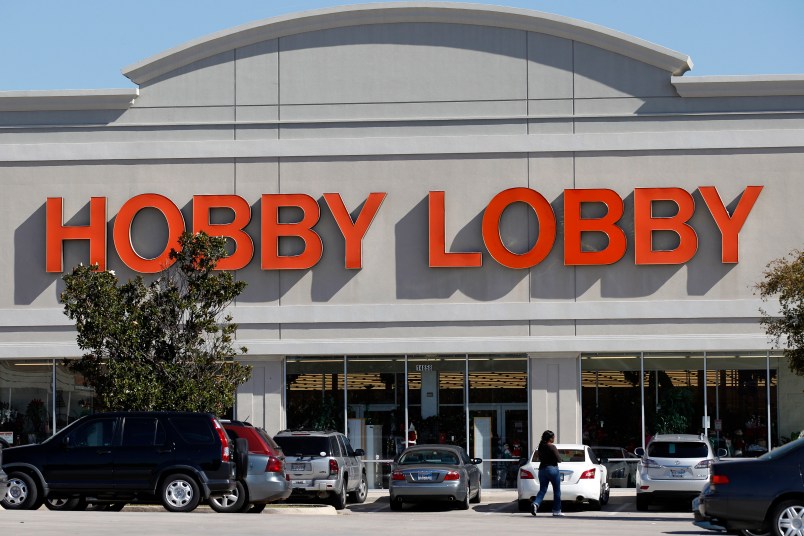In deciding for Hobby Lobby, Justice Samuel Alito wrote that “no one has disputed the sincerity of their religious beliefs.” But the reality is that this case wasn’t about anyone’s heartfelt Christian faith. It was a cynical ploy to use “religious freedom” as a fig leaf for discrimination.
Before filing their lawsuit, Mother Jones reported that the company’s health insurance covered at least two of the contraceptive drugs to which they now claim to have grave objections. Moreover, the owners’ newfound religious convictions seem to apply only to Obamacare: They’ve continued to invest retirement funds in contraceptive manufacturers and to sell products made in China, where women are frequently subject to forced abortions.
The craft giant’s lawyer claimed during oral arguments that contraception is uniquely “fraught with religious controversy.” But polling shows that nearly all Christians in America have used birth control — and that the majority of them support requiring employers to include contraceptives in their health insurance plans.
So how did the court — and the media — come to be so credulous towards such fringe and insincere claims of Christian piety?
Shameless efforts to dress up bigotry in religious garb go back to the very beginnings of the religious right, which is younger than a lot of people think. The modern politicized religious right movement was born in the 1970s in a battle over whether all-white “Christian schools” could exclude black students while maintaining tax-exempt status as religious organizations.
In the subsequent years, the religious right’s strategists grew savvier, recasting their agenda as a defense of “family values” and of “unborn babies.” And backed by deep-pocketed conservative donors, they set about building a powerful political, legal, and communications empire — largely bypassing existing church and denominational structures and relying instead on creative use of then-new communications technologies like direct mail, cable television, and talk radio.
Meanwhile, after playing a leading role in the social movements of the 1960s, mainline protestant denominations have since been devastated by generational decline, bureaucratic dysfunction, and internal battles, especially over the inclusion of LGBT people in church life and ministry. (Sensing weakness, outside religious-right organizations have contributed much of the money and infrastructure on the conservative side of these fights.)
In the Roman Catholic Church, the progressive excitement engendered by Vatican II gradually gave way to conservative retrenchment under the papacies of John Paul II and Benedict XVI, ultimately resulting in a right-wing bishops’ conference today that would be unrecognizable to the Catholic social activists of earlier decades. Increasingly, right-wing pressure groups have launched McCarthyist campaigns accusing Catholic educators and community organizers of violating official church teaching on marriage and abortion.
But while business and religious conservatives have consistently made common cause, secular progressives have grown increasingly disinterested in, or even hostile to, Christian faith. In reaction to the religious right, too many progressive leaders have adopted unhelpful keep-your-bibles-out-of-our-bedrooms rhetoric — and too many progressive foundations and donors have ruled out investing in anything religious. (One wonders how many checkbooks would open up today for a Baptist pastor from Montgomery, Alabama who gives sermons about how America must be born again.)
So today’s debates about birth control (which nearly all Christians support using) or anti-gay discrimination (which most Christians oppose) are thus a byproduct of four decades of institutional religious history. And even before Hobby Lobby, the right’s best strategists have been planning to spend the next decade in a fight to redefine “religious freedom” so as to create a backdoor for all kinds of noxious and discriminatory practices, not just in private employment but in the provision of healthcare and social services.
In a country where over 70 percent of people continue to identify as Christians, progressives simply cannot afford to continue ceding Christianity to the right.
The good news is that there are nascent signs of a progressive reawakening in American Christianity. Over the last decade, most mainline protestant denominations have moved decisively towards LGBT equality, and their leaders increasingly realize that their survival depends on their presenting a vital and visible alternative to the religious right. Catholics have been electrified not only by Pope Francis’s sudden shift in tone about LGBT people, but also by his increased emphasis on economic justice. Even among white evangelicals, there is growing evidence of a fatigue with culture-war politics and a growing interest in social-justice issues like human trafficking.
After all: Jesus Christ ministered to the poor, broke bread with outcasts, scolded the rich, blessed the meek, and counted women among his disciples. There are no shortage of Christians in America who seek to follow his example — and it’s time they had a seat at the table.
Michael Sherrard is the executive director of Faithful America, an online community with over 300,000 members, dedicated to reclaiming Christian faith as a force for social and economic justice. A veteran online organizer, he was recently named one of “14 Faith Leaders to Watch in 2014” by the Center for American Progress.






